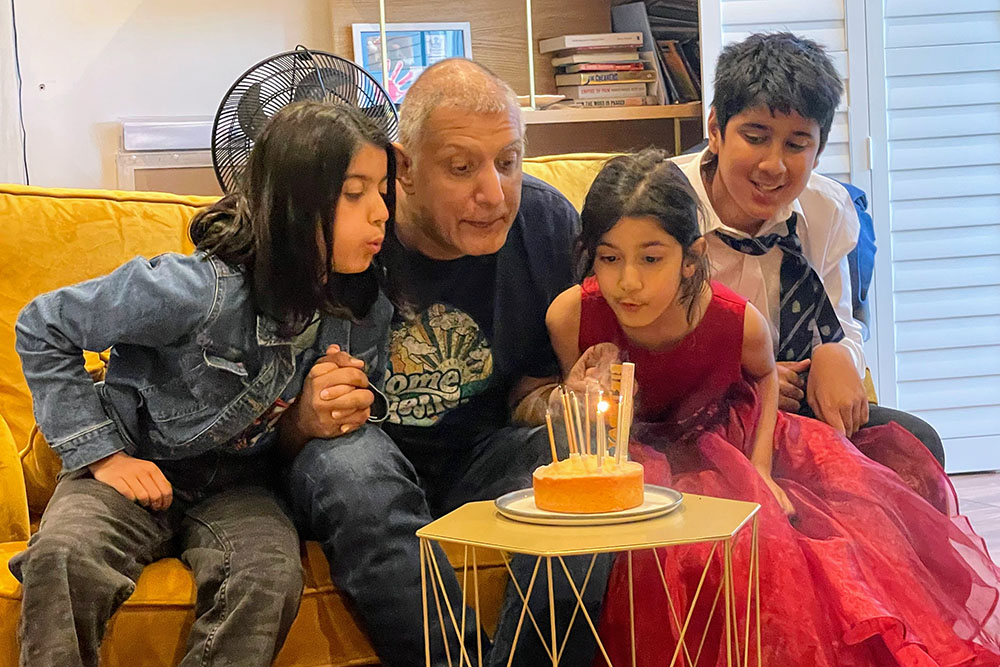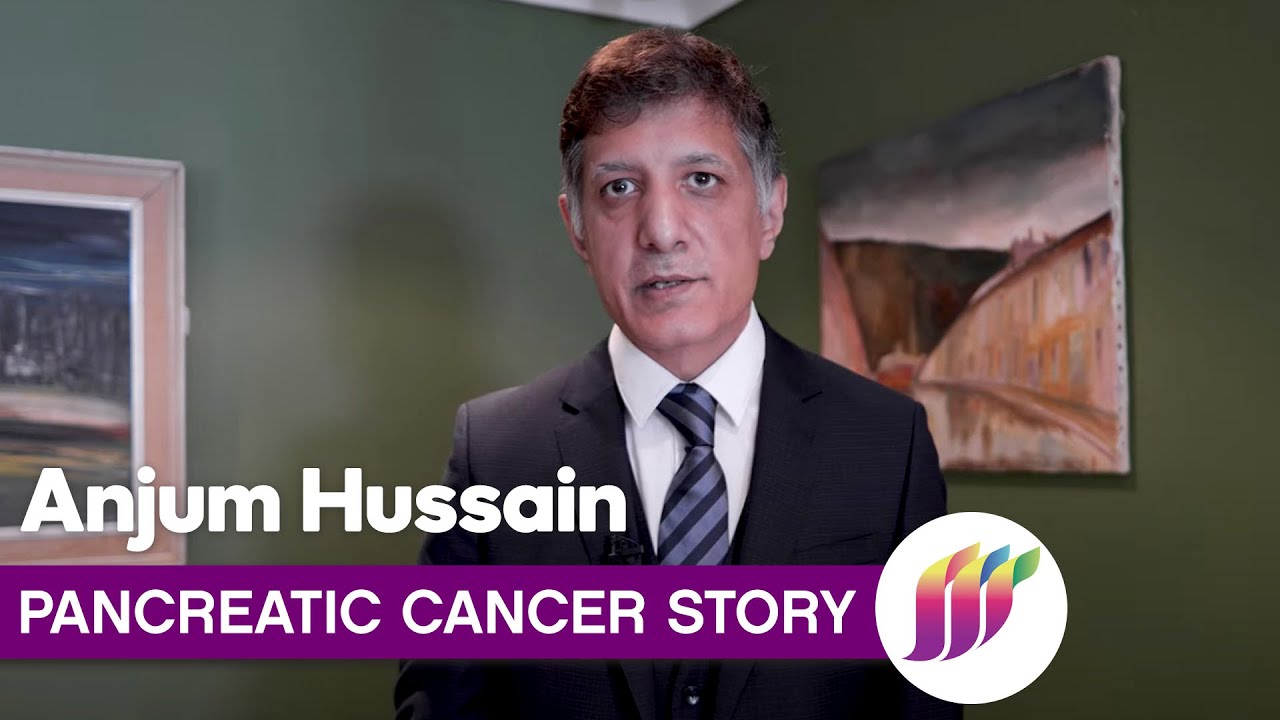
ANJUM HUSSAIN
Told He Wasn’t a Surgical Candidate, Anjum Hussain Had the Whipple Procedure in 2022
Written By: Julia Brabant
June 2023
Date of Diagnosis: March 2022
Current Status: No Sign of Cancer, Gets Tested Regularly
The Seena Magowitz Foundation has long referred to pancreatic cancer survivors as “warriors,” but Anjum Hussain is quick to point out that he doesn’t see himself as the “warrior.” Instead, he believes it’s the surgeons, researchers and health professionals who dedicate their lives to expanding options and improving outcomes for patients who are the ones most worthy of the title.
Anjum, who lives on the outskirts of London, England, was just 45 and a father of three young children when his health took a noticeable turn, with a blood test revealing he was pre-diabetic. This came as a surprise, but he came to understand its relevance sometime later. Anjum soon began to experience abdominal pain after eating, and he thought he might have either an ulcer or a stress reaction, as he was currently navigating a divorce.
When his symptoms didn’t go away, he had a gastroscopy, or an endoscopic procedure that examines the stomach, to rule out the possibility of an ulcer. He had been taking aspirin for heart disease, which may contribute to the development of ulcers over time. The test was negative, but his symptoms continued to worsen. He was losing weight quickly, and he’d started developing back pain, too, so he had a CT scan.
The CT scan revealed a tumor, leading to a diagnosis of Locally Advanced Pancreatic Cancer in March 2022. He had a series of additional tests to get a better sense of his condition including a CA-19-9 blood test, an endoscopic ultrasound and a PET scan, over the course of the next month.
Under the guidance of an internationally renowned oncologist and researcher, Anjum began chemotherapy using FOLFIRINOX. He sought opinions from two major London hospitals to see if he might be a candidate for surgery. Both surgical oncology teams determined Anjum was inoperable, believing there was too much blood vessel involvement near his tumor to make the procedure possible.
Doctors had instead recommended chemotherapy in the hope of “radiological down-staging,” i.e. shrinking of the tumor, in the vicinity of the blood vessels.
“I was advised that this operation would be risky and ‘potentially catastrophic,” he said. Anjum also recalled one of the surgeons who delivered this news pointedly asking what his “goals” were in treatment, which he found troubling. Wasn’t it obvious the goal was to cure his condition?
Disenchanted with his doctors’ bedside manner, Anjum continued to research other LAPC cases, many of which involved successful surgeries performed at major cancer centers in Europe and the U.S. He also found evidence to suggest that a patient’s “metabolic response to chemotherapy” was more important than radiological downstaging when it came to a patient’s outcome.
The more Anjum read and researched, the less confident he felt in his current care team. A medical school graduate himself, Anjum then turned to some of his former colleagues for advice, one of whom helped facilitate a meeting between Anjum and Dr. Douglas B. Evans at Froedtert and the Medical College of Wisconsin.
He recalled the “friend of a friend” who referred Dr. Douglas B. Evans as saying, “Dr. Douglas B. Evans should be your first, second and third choice. If you need a fourth option, having exhausted the first three, please let me know.”
Persuaded, Anjum planned a trip overseas to Milwaukee, Wisconsin, to see Dr. Evans.
“His view was totally different than that of my care team in the U.K.,” Anjum said, upon visiting with the doctor. “He viewed the risks of the operation as almost negligible.”
Dr. Evans wanted to see Anium again after he completed nine cycles of chemotherapy to make sure surgery still looked like a viable option. Anjum returned to Milwaukee, undergoing radiation before Dr. Evans performed a Whipple procedure in November 2022.
The complex surgery went well, with Anjum walking later that evening and leaving the hospital after a six-day recovery period. His care team told him they were able to remove the entire tumor and that there was no sign of his cancer having spread to his lymph nodes – in other words, it was about as positive of an outcome as he could have hoped to see.
Anjum remained in the United States for several more weeks before returning to the U.K. There, recovery was slow, and he noted that it took time, together with some trial and error to adapt to all the lifestyle and dietary changes that accompany a Whipple surgery
“If I follow the rules, I’m much more likely to have a good day,” he notes.
Now, seven months post-surgery, he’s had some time to reflect on his journey and the people and places that played a big part in it.
“There was an enormous amount of support for me from family, friends, friends of friends and complete strangers – some places where I would have expected it, others that I could not have imagined,” Anjum said. “It was really reaffirming for my belief in the kindness and generosity of others.”
He expressed gratitude for his mother, in particular, who he said refused to let him “lift a finger” after his diagnosis, instead supporting him to save his energy for his kids. He’d also formed a WhatsApp group with some colleagues from medical school where he shared updates, got opinions and research help, and found emotional support. “What helped me through this was that I did not feel alone, even for a moment.”
While Anjum doesn’t know what caused his cancer, he knows has the BRCA2 germline mutation, an inherited condition present since birth, that can increase his chances of getting it. His mother and grandmother had breast and ovarian cancer, respectively, so he had some family history of cancer, too.
The BRCA2 gene mutation also has 15% chance of linking to pancreatic cancer.
Despite the obvious hardships associated with an LAPC diagnosis, Anjum said he’s done relatively well, emotionally – but notes that different people handle diagnoses in different ways.
“It’s a long journey, and one with a difficult treatment course and an uncertain outcome,” he said. “You need everything you have to get through it, so don’t be afraid to put yourself first. You have license to be selfish.
Anjum’s plea to others with a diagnosis of LAPC is for them not to accept the first evaluation. “Please head to a high-volume specialist center and be sure you get more than one opinion. There is a lot of variability in the assessment, treatment and outcomes for patients with LAPC between different doctors and hospital centers. For this condition, more than others, a second or maybe even a third opinion is essential.”
Anjum continues to have follow-up visits every three months to monitor his condition and help prevent a recurrence.






I have never seen such courageous cancer patient in my life with such clear mind to face the disease